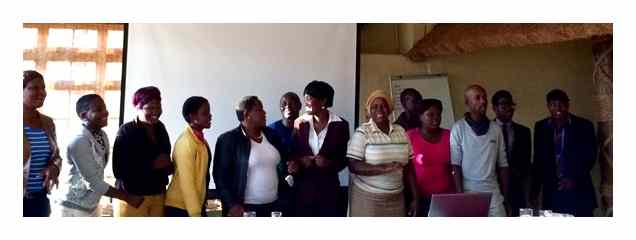South Africa: Community Takes Conservation into Their Hands in Spirit of Ubuntu

By: Ashlesha Khadse*
At least 20 representatives from 3 communities of Boelang, Moloro, Maotole in the Mariepskop region as well as local NGOs like HEAL, AWARD and GEASPHERE gathered near the Sudwala caves to talk about some of the major problems that forest communities face and the solutions to these issues.
The main concerns that came up were poachers operating in their areas, the serious pollution to water sources as well as an increase in alien tree species through timber plantations. A wide range of issues, they represent the reality that local forest communities deal with on a daily basis. Their aim they said is to conserve the plants, animals and water systems in their areas, which will also directly improve the quality of their lives.
Plantations undoubtedly stood out, not just in the conversations but also the in the landscape that surrounded the meeting venue. These usually bring invasive alien species like the water guzzling eucalyptus and acacia. They wipe out local indigenous tree species. Lantana, a highly invasive species, is spreading like wild fire and is dangerously uncontrollable. Many of these wipe out medicinal plants and local trees that form a fundamental part of community health systems and traditional medicines, putting people’s well being at risk.
While many blame forest locals for killing wild animals, a park ranger clarified that the real problems did not arise from subsistence poaching that community members did for their own food by setting up one or two traps. Rather, it was gangs that decimate entire animal populations in a small area by setting up to 300 traps in one night. Community members, they suggested could play a big role in policing and also managing areas for their own use. A local community organization HEAL is doing just that, and have in the past removed up to 14000 snares saving the lives of countless animals from poachers.
The local rivers that provide the main source of water have been seriously threatened. On the one hand they get run off from the plantations that are salting the water sources, killing fish and making it unusable. There are also a lot of used cans and plastic bottles that are being strewn about by people. Community members showed great resolve to do something about this.
Littering remains a daunting problem. Disposable nappies topped the list. It literally comes up in every meeting on water issues said the participants. People said that their rivers are blocked with nappies, in fact they have found such large quantities of nappies that it seemed like they could be coming from an industrial source, maybe a hospital. Others said that people just came in trucks and threw their bags here and left.
Some even held corporations like Coca cola and Kimberly Cark partly responsible. The companies actively set up distribution points for selling their products, making huge profits, but no collection points for their waste. While a blame game was not deemed productive, the house agreed that a variety of solutions had to be proposed including demanding rights from the government whose responsibility it is to provide trash clearance facilities so people don’t have to secretly dump waste.
The Mpumalanga valley communities have found some interesting local solutions to this problem. Besides their efforts to work with local officials, they also have local communication tools like whatsapp groups that have proven useful for sharing photos of culprits who dump their trash to stop them in the future.
The meeting ended with a real sense of Ubuntu – a South African term for cooperative and generous spirit. Everyone left with a strong resolve to continue their ongoing efforts to conserve their forests and make their territories a place they can proudly call home.
*Ashlesha Khadse is GFC Media Coordinator and participated in this workshop











